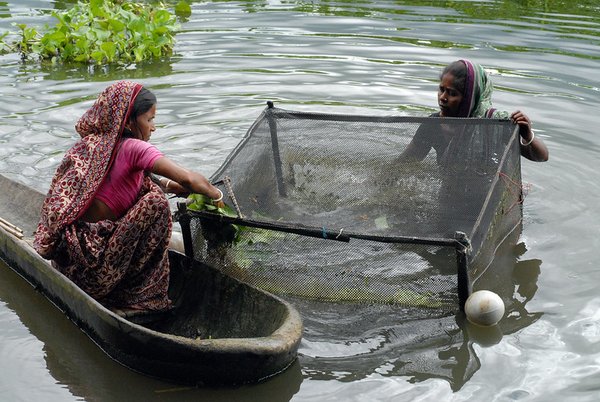- Share this article
- Subscribe to our newsletter
Farming fish in the sea will not nourish the world
The study suggests that claims that aquaculture out at sea, particularly cage farming of high-value fish species such as salmon, has the potential to equitably nourish the world are overstated and have little likelihood of delivering affordable aquatic foods to those who need it most. Policy-makers and investors must acknowledge the current and future role of inland freshwater aquaculture and capture fisheries in improving the lives of those with the most acute sustainable development needs in low- and middle-income countries.
Many of the world’s vulnerable people are dependent on fish and other aquatic foods harvested from ponds, lakes and rivers as well as oceans to support healthy diets and livelihoods. The research calls for investment to be context-specific and oriented towards inland freshwater aquaculture and coastal capture fisheries to underpin affordable and accessible nutritious food, particularly in emerging economies where demand is growing most.
Aquaculture – a fast growing form of food production
Most farmed aquatic foods originate from land-based freshwater production systems that are not as resource-constrained as often claimed. Recently, growth in aquatic food production has occurred mainly through intensification rather than horizontal expansion, enabling higher levels of farm productivity using the same or less land and water.
The economics of offshore marine aquaculture require industrial-scale cultivation of high market value fish species to meet high production costs. This will promote the participation of large investors catering to consumers with high purchasing power. By supporting a model of development based on the privatisation and exclusive use of oceanic resources, the drive to promote marine aquaculture feeds into a wider policy discourse of ‘blue growth’ with the potential to displace existing ocean users, most importantly fishers, the scientists warn. Coastal fisheries currently make extremely important contributions to the livelihoods and food and nutrition security of millions of people.
The paper’s lead author, Dr Ben Belton, WorldFish Value Chain and Nutrition Senior Scientist and Associate Professor at Michigan State University/USA, said: “This research questions a growing narrative that offshore ocean aquaculture can sustainably nourish the world. Perspectives of low- and middle-income consumers who already rely on capture fisheries and inland freshwater aquaculture for healthy and diverse diets must be part of the discussion.”
"Offshore marine aquaculture set-ups require large investments that preclude smaller producers from reaping the benefits and generate little employment. It won’t feed the world alone as it is skewed toward ‘luxury’ finfish, which most consumers in low- and middle-income countries can’t afford,” Belton forewarned.
The study's co-author, Dr Dave Little, a Professor at the Institute of Aquaculture at the University of Stirling in Scotland said: “Projections for mariculture, particularly offshore cage farming of high trophic species that are attracting the attention of investors and policy-makers, suggest that this off-shore cage farming is very unlikely to deliver affordable seafood for those who need it most. Ensuring inland aquaculture continues to develop and underpin affordable and accessible nutritious food is critical, particularly in low- and medium-income countries where demand is growing fastest.”
“The challenges around how inland aquaculture can continue to expand and remain sustainable, complementing other parts of the food systems and continuing to impact minimally on the local and global environment will require investment in R&D going forward,” Little suggested.
(cgiar/wi)
Reference:
Ben Belton, David C. Little, Wenbo Zhang, Peter Edwards, Michael Skladany and Shakuntala H. Thilsted: Farming fish in the sea will not nourish the world
In Nature Communication, November 2020;





Add a comment
Be the First to Comment